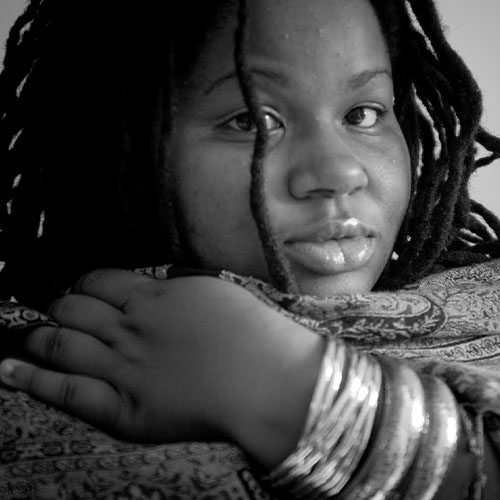Visiting Poets
Bettina Judd
Bettina Judd’s work is imbued with the echoes of history and the weight of injustice. Her new book, Patient., explores the history of gynecology, memory, and trauma. Following her own hospitalization and surgery to remove her left ovary, Judd was drawn to study the lives of Joice Heth, an African American woman exhibited as a curiosity by P.T. Barnum, and the enslaved women who were subject to nonconsensual experimentation and abuse at the dawn of modern gynecology.
Born in Baltimore and raised in Southern California, Judd pursued women’s studies at Spelman College and the University of Maryland. Her research interests include Black feminist theory, social justice, spirituality, and the representation of Black women’s bodies in Western Art. As a singer, artist, researcher, and poet, Bettina Judd takes an interdisciplinary approach toward researching and retelling the stories of those assaulted by “science,” presenting both their painful ordeals and their human dignity. Patient.’s speaker inhabits multiple roles: that of researcher, doctor, patient, Lucy, Betsey, and Anarcha—who served as guinea pigs for Dr. Marion Sims as he honed his skills in the emerging field of gynecology. There’s companionship between the voices of all these women, as the speaker says, “we are an unfortunate journey, a plunder/ darkness’s heart and treasured coast.”
As a researcher, but also as the subject of research herself, Judd began to ask such questions as: “Who gets to be studied? Who gets to research? In what ways does research practice always manage to be problematic? Why does everything have to be problematic when my body is concerned?” Her poems traverse these difficult questions with unexpected lyricism, harsh alliteration, and haunting metaphors. She uncovers no easy answers, only more questions—each more troubling than the last.
Patient, was awarded the Hudson Prize from the Black Lawrence Press and published in 2014. Judd honors include a Crossroads in the Studies of the Americas fellowship from the Five Colleges, three Cave Canem fellowships, and a Pavlis Award for Visual Artists at the Vermont Studio Center. Her poetry has been published in many journals, including Meridians, Cave Canem Anthologies XI and XII, Mythium Literary Magazine, Aunt Chloe, and Torch. Judd spent 2012-13 at Mount Holyoke College on a Five College Dissertation Fellowship in Gender Studies, during which time she taught courses in Black women’s creative production, Black feminist thought, and African American culture.
Select Poems
I must have been found guilty of something. I don’t feel innocent here
lurking with ghosts. See it happens like that. I start at a thought that
is quite benign and and up peccant, debased.
I had an ordeal with medicine and was found innocent or guilty. It
feels the same because I live in a haunted house. A house can be a
dynasty, a bloodline, a body.
There was punishment. Like the way the body is murdered by its
own weight when lynched. Not that I was wrong but that verdicts
come in a bloodline.
In 2006 I had an ordeal with medicine. To recover, I learn why ghosts
come to me. The research question is: Why am I patient?
from PATIENT. (Black Lawrence Press, 2014)
Nurses ask me,
“How much does it hurt on a scale from one to ten?”
Anarcha Wescott, Betsey Harris, and Lucy Zimmerman are taken
into the care of a reluctant country surgeon in Montgomery,
Alabama.
see blood on a white hospital sheet,
tell me I am having menstrual cramps
Betsey’s first birth,
send me home with oxycodone, ibuprofen
Lucy, months out of household duties
after five hours in triage
Anarcha, his first vesico-vaginal fistula
and another prescription
In these three, Sims shapes his speculum, invents his silver sutures,
perfects protocol for proper handling of the female pelvis.
we wake at Johns Hopkins,
unanesthesized or addicted to opium, children born, children
disappeared. Helpless help.
from PATIENT. (Black Lawrence Press, 2014)
when the body hold the mind accountable bitter orgasm
an innershift chill cough weep excite longing rash
when the tongue cannot know bursting pimple skin salt
knows deeply slave lot’s wife salt fat blood tissue
keloid memory, someone else’s memory, your memory
shame pulse when the mind is a body dehydrated
muscle disease another kind of vessel
road tributaries passage bowels birth & thought head
headache amnesia hope heart a corpse. hand palm
h o s a n n a s o u l s o u s
o
from PATIENT. (Black Lawrence Press, 2014)

